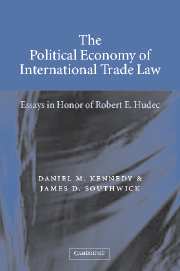Book contents
- Frontmatter
- Contents
- List of contributors
- Preface
- Foreword by E. THOMAS SULLIVAN
- Introduction: An overview of the volume
- Part I The constitutional developments of international trade law
- Part II The scope of international trade law: Adding new subjects and restructuring old ones
- Part III Legal relations between developed and developing countries
- Part IV The operation of the WTO dispute settlement procedure
- 15 Testing international trade law: Empirical studies of GATT/WTO dispute settlement
- 16 The Appellate Body and its contribution to WTO dispute settlement
- 17 A permanent panel body for WTO dispute settlement: Desirable or practical?
- Comment: Step by step to an international trade court
- 18 International trade policy and domestic food safety regulation: The case for substantial deference by the WTO Dispute Settlement Body under the SPS Agreement
- Comment: The case against clarity
- 19 Judicial supremacy, judicial restraint, and the issue of consistency of preferential trade agreements with the WTO: The apple in the picture
- 20 Should the teeth be pulled? An analysis of WTO sanctions
- 21 Problems with the compliance structure of the WTO dispute resolution process
- 22 “Inducing compliance” in WTO dispute settlement
- Bibliography of works by ROBERT E. HUDEC
- Index
21 - Problems with the compliance structure of the WTO dispute resolution process
Published online by Cambridge University Press: 02 September 2009
- Frontmatter
- Contents
- List of contributors
- Preface
- Foreword by E. THOMAS SULLIVAN
- Introduction: An overview of the volume
- Part I The constitutional developments of international trade law
- Part II The scope of international trade law: Adding new subjects and restructuring old ones
- Part III Legal relations between developed and developing countries
- Part IV The operation of the WTO dispute settlement procedure
- 15 Testing international trade law: Empirical studies of GATT/WTO dispute settlement
- 16 The Appellate Body and its contribution to WTO dispute settlement
- 17 A permanent panel body for WTO dispute settlement: Desirable or practical?
- Comment: Step by step to an international trade court
- 18 International trade policy and domestic food safety regulation: The case for substantial deference by the WTO Dispute Settlement Body under the SPS Agreement
- Comment: The case against clarity
- 19 Judicial supremacy, judicial restraint, and the issue of consistency of preferential trade agreements with the WTO: The apple in the picture
- 20 Should the teeth be pulled? An analysis of WTO sanctions
- 21 Problems with the compliance structure of the WTO dispute resolution process
- 22 “Inducing compliance” in WTO dispute settlement
- Bibliography of works by ROBERT E. HUDEC
- Index
Summary
The crown jewel of the Uruguay Round is the Dispute Settlement Understanding (DSU). The DSU, it is generally argued, brings quasi-juridical order to the General Agreement on Tariffs and Trade (GATT) regime maintenance system. Several recent World Trade Organization (WTO) dispute settlement cases, however, have highlighted structural tensions within this dispute settlement system that have the potential to gradually undermine many of the substantive obligations contained in the WTO Agreements. The problems can be classed in three dovetailing categories: a lack of incentives for swift compliance, a lack of viable alternatives to trade sanctions, and a lack of consideration for the impact of the remedies on private actors. The first two are carrot and stick problems, and highlight the need for further streamlining of the DSU process – even beyond the recent proposals by some of the Members. Effective reform will require the Members to rethink the timelines and ensure that governments which forestall compliance feel the true cost of the delay. The third, however, is a prospective problem, and cautions us against forgetting the vital need for flexibility in a supranational organization with such a diverse membership as the WTO. Not only must these problems be addressed, but the tensions between them reconciled before the DSU can fully underpin the WTO Agreements.
The first problem, the lack of incentives for swift compliance, can be seen by tracking the progress of a case along the existing DSU timeline.
- Type
- Chapter
- Information
- The Political Economy of International Trade LawEssays in Honor of Robert E. Hudec, pp. 636 - 645Publisher: Cambridge University PressPrint publication year: 2002
- 5
- Cited by



